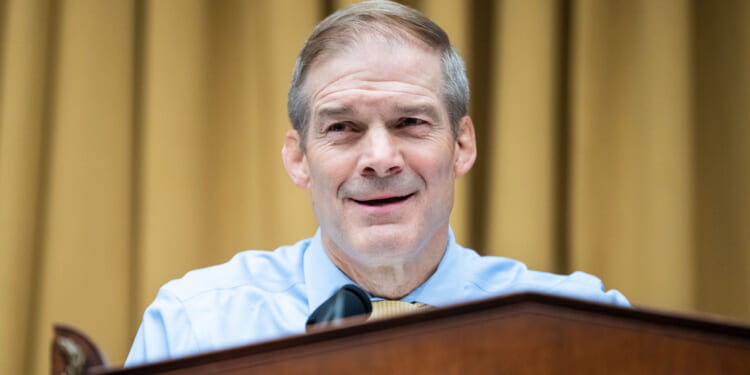It came to light last week that the the Treasury Department provided a listing of “hate groups,” which lumped together mainstream conservative organizations alongside avowed neo-Nazi and white supremacist groups, to major U.S. banks for the purpose of monitoring financial transactions in the wake of the Jan. 6, 2021 riot at the Capitol.
Experts say the pattern could lead to an increase in banks canceling the accounts of politically disfavored organizations.
The listing was taken from a report compiled by the Institute for Strategic Dialogue and the Global Disinformation Index, two U.K.-based left-wing activist groups. The report includes a listing of “American Hate Groups,” which is itself based on the classifications of the anti-Christian Southern Poverty Law Center (SPLC) and the Anti-Defamation League (ADL).
The listing classifies conservative organizations such as the Family Research Council, the Alliance Defending Freedom, the American Family Association, the Eagle Forum, Liberty Counsel, and others alongside avowed neo-Nazi and other white supremacist groups, such as the Knights of the Ku Klux Klan. compiled by the Institute for Strategic Dialogue and the Global Disinformation Index, two U.K.-based left-wing activist groups.
The report includes a listing of “American Hate Groups,” which is itself based on the classifications of the anti-Christian Southern Poverty Law Center (SPLC) and the Anti-Defamation League (ADL). The listing classifies conservative organizations such as the Family Research Council, the Alliance Defending Freedom, the American Family Association, the Eagle Forum, Liberty Counsel, and others alongside avowed neo-Nazi and other white supremacist groups, such as the Knights of the Ku Klux Klan.
According to an investigation by the House Judiciary Subcommittee on the Weaponization of the Federal Government, the Treasury Department’s Financial Crimes Enforcement Network (FinCEN) sent the report to “some of the largest financial institutions in the world, including the very financial institutions that are likely responsible for providing financial services to many of the listed ‘hate groups.’”
In January, reports surfaced that FinCEN had urged banks to “comb through the private transactions of their customers” to look for “suspicious charges” of legal activities involving political and religious expression without warrants, including the purchase of religious texts and legal firearms.
Experts warn that these actions are part of a pattern of increasing collusion between the federal government and corporate America to commit warrantless surveillance of American citizens.
But experts also fear that the Treasury Department’s actions could lead to an increase in outright cancellations of the bank accounts of conservative organizations by major financial institutions, which has already occurred on numerous occasions. As Jeremy Tedesco, a senior counsel at the Alliance Defending Freedom, testified before the Weaponization subcommittee last week, “viewpoint-based debanking is on the rise.”
As reported by National Review, some banks are citing “reputation risk” in order to justify discrimination “against gun manufacturers, distributors, and sellers; fossil-fuel producers; contractors for the Immigration and Customs Enforcement Agency; and private prisons and related services.”
In recent years, two Christian nonprofit organizations were targeted by Bank of America. Indigenous Advance Ministries, which helps impoverished widows and orphans in Uganda, had its long-standing account closed in 2023, with Bank of America claiming that it no longer serves Indigenous Advance’s “business type” and that the ministry exceeded the “bank’s risk tolerance.” Three years prior, Timothy Two Project International, a ministry that trains indigenous pastors across the globe, received “a nearly identical letter” from Bank of America and “was repeatedly stonewalled in attempts to gain clarity about the cancellation and how to resolve it.”
Similarly, in 2022 JPMorgan Chase, without explanation, canceled the account of the National Committee for Religious Freedom (NCRF), a nonprofit that advocates for religious freedom in the U.S. and which is headed by former U.S. Ambassador-at-Large for International Religious Freedom Sam Brownback. In order for its account to be reinstated, JPMorgan demanded that NCRF turn over a list of high-level donors, “a list of candidates it intended to support, and its criteria for political support.”
Experts say that the Treasury Department’s actions could lead to more conservative organizations being debanked.
“That’s what they want,” Chris Gacek, senior fellow for Regulatory Affairs at the Family Research Council, told The Washington Stand. “It’s really troubling. The Republican attorneys general need to come together on this. They need to really start digging into this debanking pattern and getting subpoenas out. One of the industries where there’s a lot of state regulation is banking. State AGs would have the ability to get subpoenas and start looking at the records and start seeing what the feds were forcing them to do. It’s very, very serious.”
Editor’s note: A previous version of this article incorrectly stated that the Biden administration’s Treasury Department distributed the “hate group” listing. It was in fact the Trump administration’s Treasury Department that distributed the listing to banks in the days following the Jan. 6, 2021 Capitol riots prior to Biden’s inauguration on Jan. 20, 2021.
Originally published by the Washington Stand
Have an opinion about this article? To sound off, please email letters@DailySignal.com, and we’ll consider publishing your edited remarks in our regular “We Hear You” feature. Remember to include the URL or headline of the article plus your name and town and/or state.












